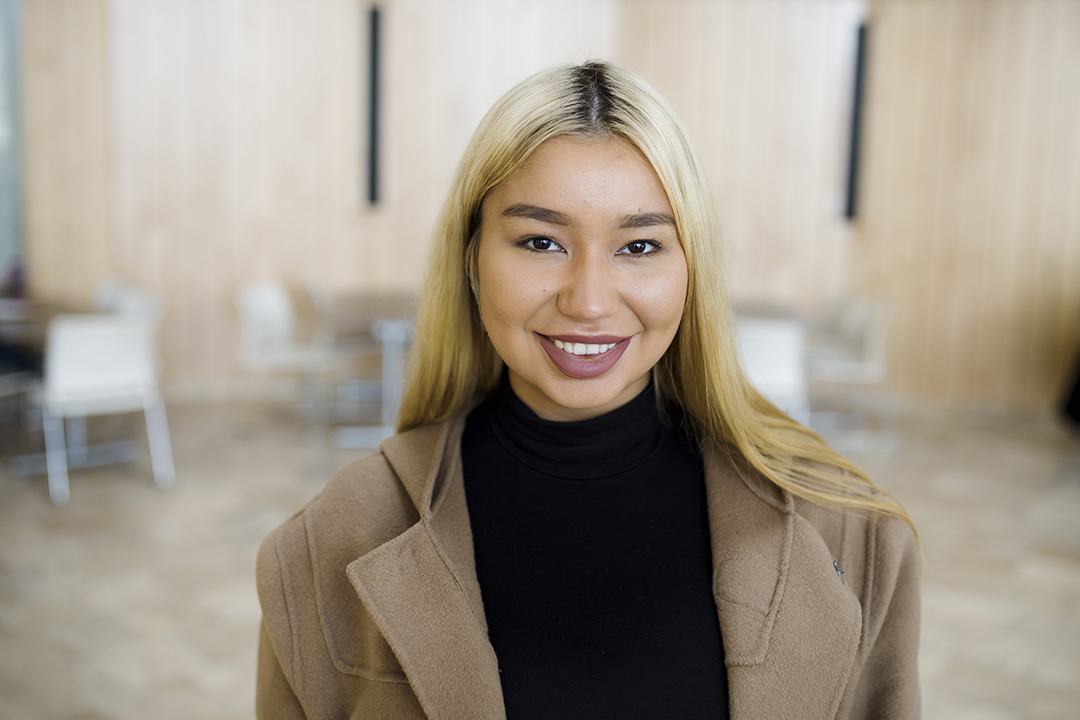
Indigenous Studies student is passionate about her culture
Being connected with her ancestors and land is all part of a balanced life for Darian Lonechild.
By John ShellingLonechild believes a healthy life is about taking care of your physical well-being as well as your spiritual well-being. For her spiritual balance she consistently participates in Plains Cree and Dakota ceremonies.
Lonechild is a Cree and Saulteaux woman from the White Bear First Nation. She serves as the female Youth Representative of the Federation of Sovereign Indigenous Nation, as well as the Co-Chair of the Assembly of First Nations National Youth Council. She is currently studying Indigenous Studies with goals of obtaining a law degree and continually advocating for Indigenous peoples.
Lonechild will be receiving an award for leadership at this year’s Indigenous Student Achievement Awards (ISAA) on Feb. 7. Indigenous students from across the University of Saskatchewan (USask) will be honoured at a ceremony to recognize their academic excellence, leadership, research endeavours or community engagement.
The ISAA is part of Indigenous Achievement Week (IAW) which celebrates the successes and contributions of Métis, First Nations and Inuit students, staff and faculty. The festivities include a public art project, speakers and celebrations in various locations across campus.
We asked Lonechild a few questions about her time at USask and what motivates her.
Why did you choose Indigenous Studies?
When I entered into my first year of my education here at the University of Saskatchewan, I entered into the introductory course of Indigenous Studies out of personal interest and curiosity. Over the course of that year, I developed a deep appreciation for Indigenous Studies, and the importance of it being offered within institutions that historically weren't welcoming spaces for Indigenous peoples. I chose Indigenous Studies as my major because of the encouraging and inspiring professors, the areas of research and potential that Indigenous Studies holds at USask.
In your biography it says you are passionate about your culture, and physical well-being by consistently participating in Plains Cree and Dakota ceremonies. Can you talk about this passion and how you see the connection between body and spirit?
A major part of healing and leading a balanced life is ensuring that you are connected with your ancestors and land. Holistic approaches to leading a balanced life includes taking care of not only your spirit by praying and going to ceremony, but making sure you look after your body. Finding a healthy way to view your body as an important gift capable of many things is important as well. As Indigenous peoples, we have a history of colonization impacting us in ways that lead us down unhealthy paths. To connect with your ceremonies and be in tune with your body is an act of resistance to hundreds of years of colonization.
What advice would you give to a first-year Indigenous student?
The advice I would give to a first year student is to go to every class. I say this because starting good habits that follow you throughout your academic career is crucial to success. You will thank yourself.
What plans do you have for the future?
I have plans of applying to law school and travelling as much as I can. I plan to spend a lot of time with my family, laughing as much as possible and continuing my learning of the world.
Has there been someone in your life who has inspired you to get to where you are today?
My mother has been the biggest inspiration in my life. She gave me life and ensured I felt love and seen the world. Her hard work, generosity and intelligence has given me the inspiration to be the most giving and loving person I can. Anytime I am leaving somewhere her last words to me are “I love you, and show leadership."
This year’s theme of the Indigenous Achievement Week is Powerful Voices. If there is one thing you can use your voice for in this moment what would it be for?
In this moment, if I could use my voice for something, I would use it to speak to Indigenous youth, and stress the importance of being an ally and listening ear for friends who are struggling with mental health issues. I understand that a stigma exists within our communities, and that has to change. You can be a part of that change by taking personal responsibility to let your friends know they can talk to you.

